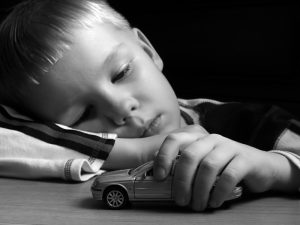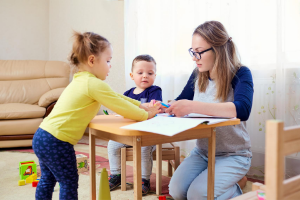Is Mental Illness a Bigger Threat to Kids than Physical Illness?
 As parents, our children’s health ranks among our top priorities. When fall arrives and flu season begins, we notice every cough and feel for signs of fever. But how attuned are we to mental health symptoms in our kids? When do we first notice that our child may be suffering emotionally or engaging in behavior that is out of the ordinary? How can we tell if our children may be struggling and could benefit from psychological help?
As parents, our children’s health ranks among our top priorities. When fall arrives and flu season begins, we notice every cough and feel for signs of fever. But how attuned are we to mental health symptoms in our kids? When do we first notice that our child may be suffering emotionally or engaging in behavior that is out of the ordinary? How can we tell if our children may be struggling and could benefit from psychological help?
October 1 is Child Health Day, an event intended to raise awareness of how we can improve and protect our children’s health. In July, the Journal of the American Medical Association (JAMA) published findings that “For the first time in more than 30 years, mental health conditions have displaced physical illnesses as the top five disabilities in U.S. children.” According to the American Psychological Association (APA), “One out of every ten children or adolescents has a serious mental health problem, and another 10% have mild to moderate problems.” The National Institute of Mental Health has further reported that “half of all lifetime cases of mental illness begin by age 14.” These statistics make it apparent that it’s time we start taking children’s mental health more seriously. We must not only target the causes but actively seek solutions and treatment approaches that will help, rather than hurt, the well-being of our children.
According to the JAMA article, “Nearly 8% of children have an activity-limiting disability.” Why is this the case? Many of us are concerned about how today’s fast-paced and uber-competitive social and economic climate affects our children. In this culture, kids face an extreme amount of pressure to develop quickly. At younger and younger ages, we aim to prepare our kids to enter a competitive world, academically, professionally, and interpersonally. Neal Halfon, MD, MPH, director of the UCLA Center for Healthier Children, Families, and Communities has suggested that “The conveyor belt [to adulthood] that we put our children on is moving much faster and at a much sharper incline than it used to… And many kids don’t have the capacity to hold on for dear life and make it to the top.”
Other factors the JAMA article cited as possibly contributing to the increase in mental health concerns in children include a “rise in premature births and subsequent risks for neuro-developmental disorders or exposure to new or more environmental toxins during pregnancy and early childhood.” The JAMA article further reported that “A growing body of research has found that developmental disorders such as ADHD have complex etiologies with multiple genetic and environmental risk factors.” Additionally, adverse events in childhood such as abuse and neglect usually cause both emotional and physical problems that linger throughout a person’s life.
Catching mental illness and intervening earlier in childhood may heighten the likelihood of a better outcome in adulthood . The consequences of mental health problems for adults can be even more severe and taxing than physical ailments, getting in the way of successes, relationships and personal goals. Many psychological ailments can even lead to heightened medical risks. For example, chronic stress has been linked to an increased risk for heart disease.
Because the stakes are so high, how we treat these “disabilities” is as important as identifying what causes them in the first place. There are some serious concerns about medicating young children. A study published in August in the Archives of General Psychiatry showed that “antipsychotic treatment has increased especially rapidly among young people, and recently antipsychotics have been prescribed in approximately the same proportion of youth and adult visits to psychiatrists.” A large amount of the medications prescribed did not include a diagnosis for which the antipsychotic had FDA approval for the patient age group.
The implications of these facts are frightening. Children are being prescribed medications that are not only uncertain to cure their symptoms but have the potential to create new problems and concerns. Anti-psychotic medications must be administered carefully, with serious consideration and the close monitoring of a mental health professional. Many of these drugs are being given to young boys with “behavior problems” with no real knowledge of their short or long-term effects. As long as we lack the data to show the effects of these medications, we take great risks in prescribing them to our kids.
Where drugs come with inherent risks, the value of therapy cannot be overstated when it comes to helping our children become mentally healthy.
As with many physical and psychological ailments, we can medicate to treat symptoms, but without getting to the source of the problem, we reduce our children’s chances of recovering from or coping with a mental health disorder. It can be difficult for parents or caretakers to identify mental health problems in their kids, and it can be even more difficult for them to seek help. The American Academy of Child and Adolescent Psychiatry (AACAP) lists some signs and symptoms to look for in children that could help determine whether to seek psychological help. The AACAP also introduces different types of psychotherapy that can be extremely beneficial to children and adolescents who are struggling with psychological issues.
If we fail to respond appropriately and in a timely manner, we lead our children down a path where their mental health problems are sure to worsen. This is not only bad for our kids but for society as a whole. So how do we improve the mental healthcare of children? We can start by asking questions and educating ourselves. We can take more of an interest in psychology and fight to de-stigmatize mental health conditions.
With the help of the non-profit mental health organization, The Glendon Association, we were able to launch the website, PsychAlive.org, with the goal of offering free resources and education to parents, families, couples, and individuals, introducing them to key psychological concepts that impact us in our everyday lives. Raising awareness and learning more about mental health will help us to notice and identify symptoms in our children sooner. By paying attention and educating ourselves, we can intervene early and get our kids the most effective treatment possible. We can demand better resources and care for children and families who are in psychological distress and build a better future for all of our children.









My almost four year old grandson is showing the same behaviors as his ADHD mom did at that age. With what we know now, can I help him earlier than we were able to help her???